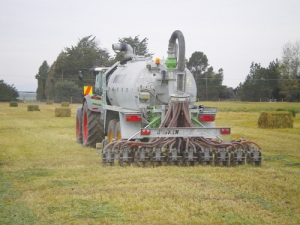Waikato dairy effluent breaches lead to $108,000 in fines
Two farmers and two farming companies were recently convicted and fined a total of $108,000 for environmental offending.
 Injecting dairy effluent directly into soil has been found as the most efficient way of applying, with the least N losses.
Injecting dairy effluent directly into soil has been found as the most efficient way of applying, with the least N losses.
New Zealand's farmers seem to have at last woken up and smelt the coffee.
They're realising that farmyard manure and dairy effluent have exceptional fertiliser value, and used wisely can greatly reduce inputs.
Many set-ups, particularly in the dairy sector, are being forced to meet increasingly tough environmental standards applied by local authorities; they are rightly concerned about runoff, groundwater contamination and destruction of local habitat.
Most 'new builds' must have a storage system to hold the effluent produced, particularly in wet seasons, and where ground conditions do not lend themselves to heavy traffic.
Unfortunately, the traditional method of application, centred on 'put it on thick lads, she'll be right' can result in two-thirds of the available N value being lost as ammonia emissions, losing the best part of the fertiliser value.
So it might pay to follow a lead from Europe: trials set up by the European Commission in 2013 looked at alternative methods of application and explored the best ways to reduce ammonia emissions.
These trials identified basically four ways to apply dairy liquid manures or slurries: the 'slap it on method', which resulted in losses of available N of up to 70%; application by dribble hose or trailing shoe applicators (losses 40% and 30% respectively); and shallow injection down to about 100mm (losses only 10%).
The findings mirror those in the Netherlands, which in the 1990s imposed mandatory injection for grassland. The results: ammonia emissions fell from 220 million kg in 1992 to 70 million by 1996 and 40 million kg by 2013.
So that foul smelling deposit excreted by Old Daisy – more often than not in the dairy shed when you're not looking – has serious potential to reduce input costs in these troubled dairy times. Stored properly and used wisely, with decent soil sampling en route, should help keep some businesses in the black.
Mating wrapped up last month at the across-breed Beef Progeny Test on Pāmu’s Kepler Farm in Manapouri.
Libby Judson is a keeper of memories from an age gone by. Tim Fulton tells her story.
A New Zealand-first native tree study has highlighted the Bioeconomy Science Institute's position as a forestry research leader.
Hemp fibre processor Rubisco is relocating its core processing facility to Ashburton as part of a $20-$30 million expansion to leverage what it says is an accelerating global demand for sustainable and renewable fibres.
Tradition meets some of the latest in technology at the 2026 East Coast Farming Expo.
OPINION: Trade Minister Todd McClay and the trade negotiator in government have presented Kiwis with an amazing gift for 2026 - a long awaited and critical free trade deal with India.

OPINION: If the hand-wringing, cravat and bow-tie wearing commentariat of a left-leaning persuasion had any influence on global markets, we'd…
OPINION: With Winston Peters playing politics with the PM's Indian FTA, all eyes will be on Labour who have the…